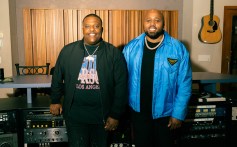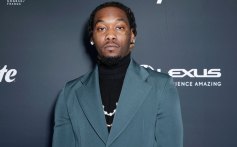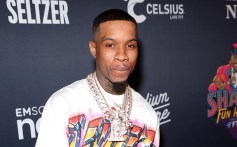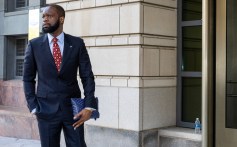Legal News
Page: 6

Trending on Billboard
A former manager of Guns N’ Roses claims in a new lawsuit that the band has unfairly blocked the release of his autobiography by threatening to sue him and his publisher as he tries to “tell his story.”
Alan Niven, who managed the iconic rock band during its late 80s heyday, claims that GNR has wrongfully invoked a confidentiality clause in his 1991 termination contract and made “repeated threats” of legal action over the memoir, Sound N’ Fury: Rock N’ Roll Stories.
“Due to GNR’s threats, Sound N’ Fury languishes in a warehouse,” Niven’s attorneys write in the lawsuit, which was obtained by Billboard. “Thousands of copies of Sound N’ Fury have been printed and continue to incur storage expenses.”
Related
Niven says his book “includes stories involving the members” of the band like Axl Rose and Slash, but that the contract is clearly unenforceable. He says that GNR members have also repeatedly discussed his role in the band’s history – meaning he’s allowed to speak about it too as a matter of free speech.
“These public disclosures by defendant’s members and agents have collectively placed the relevant facts of the band’s relationship with plaintiff into the public domain and made them matters of public interest,” Niven’s lawyers write. “Enforcement of the confidentiality provision would be illegal and in violation of the Constitutional protection of free expression.”
A rep for Guns N’ Roses did not immediately return a request for comment on Wednesday.
Niven started managing Guns N’ Roses in 1985, shortly after the band solidified its best-known lineup: Rose, Slash, Izzy Stradlin, Duff McKagan and Steven Adler. And he was there for GNR’s rise to stardom with the chart-topping Appetite for Destruction, which featured smash hit singles like “Welcome to the Jungle,” “Paradise City,” and “Sweet Child o’ Mine.” Niven was fired in 1991 by Rose, who reportedly refused to release the band’s next album until Niven was gone.
As Niven tells it in his lawsuit, he was instrumental in the band’s success: “Niven’s work with GNR is the stuff of legends, as he took them from nowhere to headlining Wembley Stadium in less than six years.”
Related
After he was “betrayed” and fired by the band, Niven admits that he signed a “buy out” agreement covering the terms of his exit. He says it contained a “privacy/confidentiality” provision that required both sides to avoid sharing information about the other learned during their long partnership.
But Niven says that in the years since, GNR members have made “many references” to him, including “inflammatory or even defamatory” ones. He specifically cites several examples, including a 2008 magazine interview in which Rose suggested that Niven was “always tryin’ to convince someone they should fire me” and was seeking a “a personal pay day” from their record label.
“Members of GNR have mentioned Niven, sometimes in a derogatory [way], starting at least as far back 1991,” his lawyers write. “Niven’s comments about the band are thus justified by the agreement, which allows him to comment on matters raised by the band first.”
He also claims the agreement is void for an even simpler reason: That Hudson, McKagan and Stradlin signed the deal, but that Axl himself never did so: “It is unclear who is attempting to enforce the agreement now, and whether they have standing to do so,” his attorneys say. “Rose did not sign the agreement, and one signatory (Stradlin) has remained silent.”
In technical terms, Niven is seeking a “declaratory judgment” that the 1991 contract is unenforceable, or that he is not violating the terms of it by releasing his book. He is also suing the band for damages over accusations that it “intimidated” his publisher into delaying the books release.
“Defendants’ interference has resulted in damages to Niven from lost sales and lost reputation in the market for his book and life story, only a fraction of which has anything to do with Defendants’ rock group,” he says. “Individual advance orders have been cancelled. The books have incurred storage fees. Niven’s momentum in the press has been destroyed.”
Trending on Billboard
Some Taylor Swift fans are up in arms over a video on the official White House TikTok account set to “The Fate of Ophelia” — and many of them are encouraging the pop superstar to take legal action against President Donald Trump.
The Monday (Nov. 3) TikTok video pairs Swift’s The Life of the Showgirl lead single — currently in its fourth week at No. 1 on the Billboard Hot 100 — with images of Trump and his associates. One frame shows Trump’s mug shot while Swift sings, “Don’t care where the hell you’ve been.” The video ends with a photo of the president scooping McDonald’s French fries under a slightly altered lyric reading, “The fate of America.”
Related
Swift has not commented on the post, but it’s unlikely that she’s happy about it. Historically, the star has not pledged her allegiance to Trump’s team; she’s only endorsed Democrats, including Kamala Harris in the 2024 election, and Trump, in turn, has insulted Swift repeatedly, including by posting “I HATE TAYLOR SWIFT” after the Harris endorsement.
In the TikTok comments, some Swifties are putting on their lawyer hats. “TAYLOR SWIFT SUE THEM FOR USING YOUR SONG!” wrote one. “I would absolutely LOVE if Tay found a way to sue them for this,” wrote another. “One freaking huge lawsuit on the horizon,” another prediction read.
Is the White House’s use of “The Fate of Ophelia” legal? Probably not. While individual TikTok users can soundtrack their videos with pre-cleared songs, commercial entities are required to obtain so-called sync licenses from copyright owners. The White House did not return an inquiry on Tuesday (Nov. 4) as to whether they got a sync license for the post, but given Swift’s public rebukes of Trump, and the fact that the singer is famously protective of her catalog, it’s unlikely that she greenlit such a license.
Related
As Billboard previously reported during Zach Bryan’s public scuffle with the Trump administration over its use of his track “Revival” in an X post, there are a number of legal avenues for artists to take when their songs are used on social media without licenses. Swift’s lawyers could send a cease-and-desist letter to the White House, or they might lodge a formal takedown notice directly with TikTok under the Digital Millennium Copyright Act.
If these administrative procedures are unsuccessful, Swift could indeed bring a formal lawsuit against the federal government for copyright infringement. She’s no stranger to intellectual property litigation, having both faced copyright claims herself and gone on the legal offense over the years.
However, it’s hard to imagine Swift taking the drastic step of suing the White House. The courts are public by nature, and Swift has a carefully maintained image. This is especially true in the political arena, where the singer’s statements have always been measured (“The choice is yours to make,” she told fans in her post endorsing Harris last year).
Related
Swift, therefore, may not want to become publicly embroiled in what would almost certainly be viewed as a partisan legal battle. Nothing is certain, though, and only time will tell.
Swift’s reps did not return a request for comment on the matter.
Trending on Billboard
THE BIG NEWS: Universal Music Group and artificial intelligence music service Udio reached a landmark agreement last week to end their lawsuit – the first major settlement in the battle over the future of AI music. Here’s everything you need to know.
The deal, announced Wednesday, will end UMG’s allegations that Udio broke the law by training its AI models on vast troves of copyrighted songs — an accusation made in dozens of other lawsuits filed against booming AI firms by book authors, news outlets, movie studios and visual artists. The agreement involves both a “compensatory” settlement for past sins and an ongoing partnership for a new, more limited subscription AI service that pays fees to UMG and its artists.
Related
-The agreement is much more than a legal settlement, Udio CEO Andrew Sanchez told Billboard’s Kristin Robinson in a detailed question-and-answer session just hours after the news broke: “We’re making a new market here, which we think is an enormous one.”
-The deal between UMG and Udio will resolve their legal battle, but broader litigation involving rival AI firm Suno and both Sony Music and Warner Music is still very much pending. Are more settlements coming? Does the deal impact the case? Go read my look-ahead analysis of the ongoing court battle.
-Will AI do more harm than good for the music business? That’s the question Billboard’s Glenn Peoples is asking – and financial analysts don’t have a clear answer. Some believe AI’s negatives outweigh its positives, while others see mostly upside. Maybe it’s just too early to know, Glenn says: “In the near term, expect more deals like UMG’s partnership with Udio. Over the long term, expect to be surprised.”
-Artist advocates are already demanding answers about how exactly this whole thing will work. According to the Music Artists Coalition, talk of “partnership” and “consent” are all well and good, but details are what matter: “We have to make sure it doesn’t come at the expense of the people who actually create the music,” MAC founder Irving Azoff said.
Related
-To put it lightly, Udio subscribers were not big fans of the settlement, which saw the company immediately disable downloads – even for songs that users created long before the deal was reached. After two days of outrage and threats of legal action, Udio said it would open a 48-hour window for users to download their songs. But with wholesale changes to the platform coming soon, will that be enough to satisfy them?
You’re reading The Legal Beat, a weekly newsletter about music law from Billboard Pro, offering you a one-stop cheat sheet of big new cases, important rulings and all the fun stuff in between. To get the newsletter in your inbox every Tuesday, go subscribe here.
Other top stories this week…
AINT OVER YET – Drake is now formally appealing last month’s court ruling that dismissed his defamation lawsuit against Universal Music Group (UMG) over Kendrick Lamar’s diss track “Not Like Us,” prolonging a messy legal drama that has captivated the music industry and, at times, drawn ridicule in the hip-hop world.
DIDDY APPEAL – Sean “Diddy” Combs is appealing too – and he’ll get a fast-track process to do it. With such cases sometimes lasting years, his lawyers argued that he could be nearly finished with his three-ish year prison sentence by the time an appellate court rules on his prostitution convictions.
Related
POT SHOTS – Offset is facing a new civil assault lawsuit claiming he punched a security guard in the face at a cannabis dispensary in Los Angeles after being asked to show his I.D., sending the staffer to the emergency room.
MASSIVE FINE – Fugees rapper Pras Michel must forfeit a whopping $64 million to the government following his conviction on illegal foreign lobbying and conspiracy charges, a federal judge says, overruling his protests that it’s “grossly disproportionate.”
DRAKE SUED – Drake and internet personality Adin Ross are facing a class action accusing them of using “deceptive, fraudulent and unfair” practices to promote online sweepstake casino Stake and “encourage impressionable users to gamble,” including using house money to do it.
DRAKE NOT SUED – Another class action, this one against Spotify, claims that the platform has turned a “blind eye” to streaming fraud and allowed billions of fake plays. It alleges that Drake is one of the most-boosted artists, but the rapper is not named as a defendant nor accused of wrongdoing.
Related
FAIR TRADE? Cam’ron is suing J. Cole over allegations he reneged on a deal to swap featured credits – claiming he provided a verse for Cole’s “Ready ’24” but that Cole repeatedly declined to do the same, or even appear on Killa Cam’s podcast.
CUSTODY TRUCE – Halle Bailey and DDG temporarily agreed to share custody of their son and drop domestic violence claims against each other, putting a halt to the musicians’ messy legal battle after months of back and forth.
NEWJEANS, SAME LABEL – A Korean court issued a ruling rejecting NewJeans’ attempt to break away from its label ADOR, dealing a major victory to the HYBE subsidiary in its closely-watched legal battle with the chart-topping K-pop group.
DEPOSITION DRAMA – A judge says Tory Lanez must sit for a deposition in litigation stemming from his alleged shooting of Megan Thee Stallion in 2020. The case was filed by Megan against gossip blogger Milagro Gramz, who she claims spread falsehoods about the shooting.
NOT VERY CASH MONEY – Former Hot Boys member Turk is being sued by a concert promoter over online threats that supposedly threatened to derail a Cash Money Records reunion tour featuring Birdman and Juvenile
UGLY DIVORCE – Sia and her estranged husband are fighting over custody of their child amid divorce proceedings — and the crossfire is getting ugly. Among other claims, he says the pop star is a drug addict who can’t care for a baby, and she says he was investigated over child pornography.
Trending on Billboard Danish rights organization Koda has filed a lawsuit against AI music company Suno, alleging that it infringed on copyrighted works from its repertoire — including songs by Aqua, MØ and Christopher. Koda claims that Suno used these works to train its AI models without permission and has concealed the scope of what […]
Trending on Billboard
Offset has been hit with new lawsuit claiming he attacked a security guard at a cannabis dispensary in Los Angeles after being asked to show his I.D.
The rapper (Kiari Cephus) faces civil assault and battery claims in a complaint filed last Wednesday (Oct. 29) by Jim Leobardo Sanchez, a security guard at the MedMen licensed recreational dispensary near Los Angeles International Airport.
Related
Offset and a group of associates visited the dispensary on March 14 of this year, according to the lawsuit. Sanchez alleges that the rapper grew violent when he was asked to provide I.D. before entering the store.
“Without legal justification or provocation, defendant Cephus became hostile, verbally confrontational and physically attacked plaintiff by striking him in the face,” writes Sanchez’s attorney Michael Karikomi. “Several unidentified individuals who were accompanying defendant Cephus then proceeded to grab, push and further assault and batter plaintiff.”
Sanchez says he was in “immediate and severe pain” after the alleged attack, and was treated by paramedics at the scene before being transported by ambulance to the emergency room.
According to the lawsuit, Sanchez has continued to suffer due to Offset’s behavior — and he now wants financial compensation from the rapper.
“Plaintiff suffered physical injuries, emotional distress, incurred medical expenses, suffered lost income and continues to experience pain and discomfort,” reads the lawsuit, which asks for unspecified monetary damages.
Offset’s reps did not immediately return a request for comment on Monday (Nov. 3).
This isn’t the first time Offset has been accused of attacking a security guard. In 2023, he was sued for allegedly assaulting a guard at a convention put on by Complex Networks two years earlier. That lawsuit claimed Offset and fellow rapper YRN Murk got physical after being told the event was restricted.
The security guard in that case, Daveon Clark, has not yet managed to serve Offset with legal papers. The claim remains pending.
Trending on Billboard
Drake’s music has received “billions of fraudulent streams” on Spotify, according to a new class action lawsuit that says the streaming giant turned a “blind eye” to bots and thus deprived fair pay to thousands of other artists.
In a case filed Sunday in Los Angeles federal court, attorneys for a rapper named RBX (Eric Dwayne Collins) say Spotify is “all too happy” to ignore billions of fake streams per month that falsely inflate some artist stats – and that Champagne Papi was one of the most-boosted artists.
“Billions of fraudulent streams have been generated with respect to songs of ‘the most streamed artist of all time,’ Aubrey Drake Graham, professionally known as Drake,” the rapper’s lawyers write. “But while the streaming fraud with respect to Drake’s songs may be one example, it does not stand alone.”
Related
The lawsuit claims that Spotify’s policies against fake streams are “nothing more than window dressing” and that the company would prefer to do nothing because bots help the company’s bottom line.
“The more users (including fake users) Spotify has, the more advertisements it can sell, the more profits the company can report, all of which serves to increase the purported value delivered to shareholders,” RBX’s attorneys say.
And such “cheating” has real victims, the lawsuit says: “This mass-scale fraudulent streaming causes massive financial harm to legitimate artists, songwriters, producers and other rightsholders whose proportional share is decreased as a result of fraudulent stream inflation on Spotify’s platform.”
A spokesman for Spotify did not immediately return a request for comment. Drake was not named as a defendant in the lawsuit nor accused of any wrongdoing; a rep for the star did not return a request for comment.
Streaming fraud on platforms like Spotify, Apple Music and Amazon Music is a longstanding problem, made all the more challenging in recent years by advances in artificial intelligence and other sophisticated spoofing technologies. By some estimates, several percentage points of all streams are inauthentic – meaning billions of monthly plays. Since royalties on digital services are divvied up among rightsholders from a finite pie, such phony numbers siphon off revenue from legitimate streams.
Related
In one extreme example, a North Carolina man was indicted last year on federal charges that he used AI to help create “hundreds of thousands” of songs and used thousands of bots to stream them millions of times. The feds say the scheme diverted over $1 million per year from real artists.
In his lawsuit on Sunday, RBX says he wants to force Spotify to take more aggressive action against such behavior on its platform, calling its current anti-fraud policies “inadequate at best.”
“Plaintiff brings this case to bring justice for his brother and sister creators and entertainers,” his lawyers write. “In doing so, Plaintiff gives a voice to more than one hundred thousand rightsholders who, among other things, may be unable or too afraid to challenge Spotify, a powerful force in the music business whose failure to act has caused significant problems and great financial harm.”
In technical terms, the lawsuit accuses Spotify of legal negligence, meaning the company caused harm to him and others by failing to take steps it should have taken. He also claims the company violated California state law against unfair competition.
The case is filed as a proposed class action, meaning RBX wants to represent thousands of other artists who have allegedly faced the same harm he did. But such other artists will only be drawn into the case if a judge grants approval – a difficult threshold to clear in any class action litigation.

Trending on Billboard
Former Hot Boys member Turk is being sued by a concert promoter over online threats that supposedly threatened to derail a Cash Money Records reunion tour this summer.
The $12 million breach of contract and defamation lawsuit, filed in New York federal court on Wednesday (Oct. 29), is the latest in a bitter legal salvo between Turk (Tab Virgil Jr.) and promoter Dope Shows over the Cash Money Millionaires 30th Anniversary Tour. Named in honor of a Cash Money Records supergroup from the ’90s, the ongoing reunion tour features Cash Money figures like Birdman, Juvenile and former Hot Boy B.G.
Related
Turk originally signed onto the tour as well, but was kicked off the roster before his first performance this summer. The rapper subsequently sued Dope Shows for $340,000 in Florida last month, alleging he was removed from the tour because the promoter wasn’t selling enough tickets and ran out of money to pay him.
Now, Dope Shows is countering in its own lawsuit that money had nothing to do with Turk’s removal. Rather, the promoter says it had to boot Turk because he had been physically threatening B.G. on social media — leading venues to voice concerns about potential violence and risking disruptive intervention from B.G.’s probation officer.
Dope Shows alleges that in response, Turk began posting defamatory content on Instagram, spreading his false narrative that the promoter was struggling financially. Dope Shows claims Turk’s Florida case is a “sham lawsuit” that merely serves to amplify those falsehoods.
Related
“Desperate to revive his flagging rap career, Turk is attempting to sabotage the tour through childish and petulant antics that he hopes will regain the public’s attention,” writes Dope Shows’ lawyer, Jeffrey Movit. “Turk’s publicity stunts are an abject failure, as they have done nothing to advance his career. Rather, through his malicious and misguided actions, Turk has created nothing more than massive legal liability for himself in this lawsuit”.
Dope Shows alleges that Turk owes $5 million for breach of contract and $7 million for defamation. According to the lawsuit, Turk’s conduct has deterred fans from attending the reunion tour and led other artists to doubt the promoter’s abilities.
Turk’s attorney, Paul Aloise, denied all of Dope Shows’ claims in a statement to Billboard on Friday (Oct. 31). Aloise says the new lawsuit is a “desperate attempt” by the promoter to “try and shift the blame away from their own unethical business practices and promotional failures.”
“While the complaint defames my client and says that he was attempting to sabotage the tour to try and revive his flagging rap career, the complaint conveniently leaves out the fact that on August 3, 2025, Turk, released his own album, JOSEPH, on iTunes, which peaked at #5 on the iTunes Hip-Hop Chart,” added Aloise. “Thus, my client has no intentions of trying to sabotage a tour he wants to be on, let alone to help his rap career.”
Trending on Billboard
A judge has rejected Tory Lanez’s latest attempt to avoid sitting for a deposition in litigation stemming from his alleged shooting of Megan Thee Stallion in 2020.
Lanez (Daystar Peterson), who’s serving a 10-year prison sentence for allegedly shooting Megan in the foot during a drunken argument, is a begrudging witness in her civil defamation lawsuit against gossip blogger Milagro Gramz. The Houston rapper (Megan Pete) claims Lanez is paying Gramz (Milagro Cooper) to spread falsehoods about the incident and the 2022 trial.
Related
Lanez’s lawyers claim deposition testimony could hurt the Canadian rapper’s ongoing appeal of his criminal shooting conviction. But Judge Lisette M. Reid says in a Thursday (Oct. 30) order that it’s “unclear” how that’s possible.
“The focus of Mr. Peterson’s deposition is his relationship with defendant Cooper, not with plaintiff,” writes the judge. “Thus, the court does not see how testimony regarding Mr. Peterson’s communications and relationship with defendant would serve to prejudice his criminal appeal.”
Judge Reid says Lanez must be deposed, and he can assert his Fifth Amendment right against self-incrimination “on a question-by-question basis, the propriety of which will be decided by the undersigned who will be supervising the deposition.”
Reps for Megan and Lanez did not return requests for comment on Friday (Oct. 31).
Related
Megan’s attorneys have been attempting to depose Lanez for months. Lanez’s first deposition was held at the jail in April, but he was so uncooperative that the questioning had to be stopped after just 44 minutes.
Lanez was held in contempt for this behavior and ordered to sit for a second deposition, this time under a judge’s supervision. He showed up to the courthouse on Sept. 15 with a new lawyer, Crystal Morgan, who this time asserted that Lanez wouldn’t answer any questions at all due to concerns about the appeal.
A third attempt at Lanez’s deposition will be held “at a date agreed upon by all parties,” wrote Judge Reid, who says she may order Lanez to repay Megan’s lawyers for the time they’ve expended on the back and forth.
The deposition battle comes as a Nov. 17 trial date is fast approaching in Megan’s lawsuit against Gramz. The rapper says Gramz has been posting lies about Lanez’s shooting trial, including false information that the gun in question went “missing,” to undermine the guilty verdict and ruin her reputation. Gramz denies any wrongdoing and says all of her social media activity is First Amendment-protected free speech.
Lanez hasn’t been the only difficult witness in the case. Two of his close allies — legal advocate Ceasar McDowell and blogger DJ Akademiks — have also been accused of derailing their depositions with disruptive behavior.
Trending on Billboard
Fugees rapper Pras Michel must pay a whopping $64 million to the government following his conviction on illegal foreign lobbying and conspiracy charges, a federal judge ruled Thursday (Oct. 30).
The rapper’s lawyers had called such a massive order “grossly disproportionate” to his 2023 conviction, in which Michel was found guilty on accusations that he orchestrated a “foreign influence campaign” to get the U.S. to drop an investigation into fugitive Malaysian financier Jho Low.
Related
But in the ruling on Thursday, Judge Colleen Kollar-Kotelly said that Michel had “obtained proceeds in the amount of at least $64,923,226 from his offenses,” which included conspiracy, witness tampering and failing to register as an agent of China. The judge’s written opinion explaining her rationale was not made publicly available.
Michel faces sentencing on those same convictions next month, when he could receive a decades-long prison sentence. His attorneys have called for a far lighter sentence of only 36 months. A spokeswoman for Michel did not immediately return a request for comment on Thursday.
Composed of Lauryn Hill, Wyclef Jean and Michel, the Fugees rose to fame in the 1990s with hits like “Killing Me Softly,” “Ready or Not” and “Fu-Gee-La.” After splitting up in 1998, the three each had successful solo careers and mostly stayed separate until recent years, when they’ve attempted multiple reunion tours.
Related
In 2019, Michel was hit with sweeping federal criminal charges over accusations that he funneled money from Low, the mastermind of the billion-dollar 1MDB embezzlement scheme, to a lobbying campaign aimed at getting the first Trump administration to drop its investigation into the disgraced financier. He was also accused of secretly funneling Low’s money to Barack Obama’s 2012 presidential campaign, and of later trying to influence an extradition case on behalf of China.
In April 2023, following a trial that included testimony from actor Leonardo DiCaprio and former U.S. Attorney General Jeff Sessions, Michel was convicted on 10 counts, including conspiracy to defraud the U.S. government.
Thursday’s forfeiture order was delayed by several months after Pras announced in August that he’d had emergency surgery for colon cancer removal. The August hearing was eventually rescheduled for last week, setting the stage for Thursday’s decision.
Following his sentencing next month, Michel will likely appeal both his sentence and the underlying convictions to a higher court.
Trending on Billboard
Udio now says it will briefly allow subscribers to download their existing songs following widespread backlash to drastic changes made to the platform following the AI firm’s licensing settlement with Universal Music Group (UMG).
The move comes in response to growing outrage — and even threats of legal action — from users after Udio struck the UMG deal, under which the AI company immediately barred its paying subscribers from downloading their own songs, even those they had created long before the UMG deal.
Related
In the statement posted late Thursday (Oct. 30) to Reddit, Udio said it would provide a 48-hour window starting Monday (Nov. 3) for all users to download their existing songs. Any songs downloaded during that time will be covered by the prior terms of service that existed before the UMG settlement.
“Not going to mince words: we hate the fact we cannot offer downloads right now,” Udio CEO Andrew Sanchez wrote in that post. “We know the pain it causes to you, and we are sorry that we have had to do so.”
In the Reddit post, Sanchez also tried to explain the reasons for the original change, saying that Udio is a “small company operating in an incredibly complex and evolving space” that had chosen to partner directly with artists and songwriters. “In order to facilitate that partnership, we had to disable downloads,” he said.
Related
If the download ban is a requirement of the legal settlement with UMG, how can Udio now reverse course and allow users to download their songs? Sanchez said Udio had “worked with our partners to help make this possible.” A spokesman for UMG did not return a request for comment.
Any existing songs that are downloaded during next week’s window will be owned by the users who made them. Under Udio’s terms of service, the company grants all users of the platform — paid subscribers or free users — any ownership rights to their songs, including express permission to use them for commercial purposes. The company does require users of the company’s free tier to include attribution that the song was made with Udio.
The deal between UMG and Udio, announced Wednesday (Oct. 29), will end UMG’s allegations that Udio broke the law by training its AI models on vast troves of copyrighted songs. Under the agreement, Udio will pay a “compensatory” settlement, and the two will partner on a new subscription AI service that pays fees to UMG and its artists, and allows artists to opt in to different aspects of the new service.
Related
The revamped Udio will be quite a bit different from the current service — a “walled garden” where fans can stream their creations but cannot take them elsewhere. While the new version won’t launch until next year, the firm immediately disabled all downloading on Wednesday, a move that drew predictable backlash from its users, particularly on the company’s Reddit sub.
“This feels like an absolute betrayal,” wrote one Reddit user. “I’ve spent hundreds of $$$ and countless hours building tracks with this tool,” wrote another. “No one warned us that one day, we wouldn’t even be able to access our own music. You can’t just pull the plug and call that a ‘transition.’”
Some Udio subscribers even floated the idea of legal action: “What you have committed is fraud. Just so you understand,” wrote one user. “You may not feel any legal ramifications immediately, but not everyone who used your platform is without resources.”
The window for downloads will kick off on Monday, but it’s unclear exactly when. Udio said in the post that it would “provide the exact starting time and end time” on Friday (Oct. 31), but had yet to do so by Friday afternoon. An Udio spokesperson did not offer more details when reached by Billboard for comment.

 State Champ Radio
State Champ Radio 






